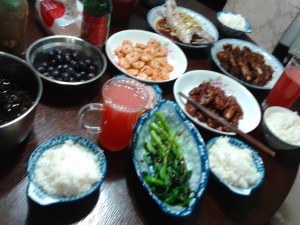No one likes to look foolish or lose face in public but here in China they take saving face to a whole new level. They are very concerned with saving face, not only for them but for other people as well. Well, many people tell white lies in America to save face for themselves or others but Chinese people often play the avoidance game rather than face issues head on. For example, if you ask a Chinese person for directions they just point you in the wrong direction or give you false directions rather than saying they don’t know. This is a traditional Chinese way of approaching things so I didn’t really expect it to impact my study abroad life as much as it has.
As many of you know, I opted to live in a home stay. The night we met our host parents, we were all gathered in the activity room. We were all whispering our last minute worries, tapping our feet, hugging each other goodbye, pacing a bit, fidgeting with our clothes, and doing a lot of nervous grinning. When my name was called a middle-aged single Chinese woman stood up to claim me. We hugged, introduced ourselves, and then took my luggage out to the car. She had an apartment about a half hour from BeiWai (the Beijing foreign studies university and the school we study at here). I unpacked all my luggage (when did I acquire so much stuff?) and made myself a home away from home.
The next day, John pulled me into our student lounge and said, “I have something to tell you. You can’t go back to your home stay.”
“Excuse me?” I replied in disbelief.
“They don’t have a hukou. We have to pull you out of there immediately,” he said.
I was speechless. You see, in America anyone can live in an city or state you want to. That’s not the case in China. The hukou system created by Mao restricts the places Chinese people can live. A hukou is basically a residence permit. It registers your place of birth with the local police and labels you either rural or urban. You can only receive free social services in the place where your hukou says you live and if you move to another city you must get a temporary work or residence permit. If you don’t, you are living there illegally. For this reason, I have to register myself at the police station with my host family so the Chinese government knows where I am staying. Since my host family didn’t have Beijing hukou, they couldn’t register me with the police and so I would have been in China illegally. I have no desire whatsoever to be arrested so I moved back to the dorms temporarily. My host mother didn’t talk to me about it. She didn’t want to embarrass me or her by talking it so she just played the avoidance game. I only knew about it because one of our teachers called to talk to her and she (luckily) told him.
IES eventually found me another home stay. I now had a host father, mother, and a little brother. He was thirteen years old and learning English. I stayed with them for a couple weeks before another of our RA’s pulled me aside. “I have to talk to you about something,” he said as he sat me down. “Your family is emigrating to America next week. They want you to move out in two days.”
“Excuse me?” I couldn’t believe it. This had to be the universe telling me I was destined to live in the dorms or something. True to form, my host family didn’t tell me anything about it. They only told my teacher who told the RA who told me. When they saw me packing up my stuff, my host mother actually did explain some of it to me (my host father got a job in America). My host father gave me a phone call and apologized for it. This was the most plain speaking I’ve experience from Chinese people about situations like that.
So now I am back in the dorms with a Chinese roommate. As soon as she met me she gave me a huge hug and introduced herself. It was super sweet! We don’t have opposite sleeping schedules so far, we don’t have different living styles, and we have a mutual respect for each other’s space and time. She is more willing than older Chinese people to speak honestly with me on a lot of issues; I’m glad for that. I appreciate straight forwardness to a point. I have high hopes for my current living situation and anyway, third time is the charm, right?

